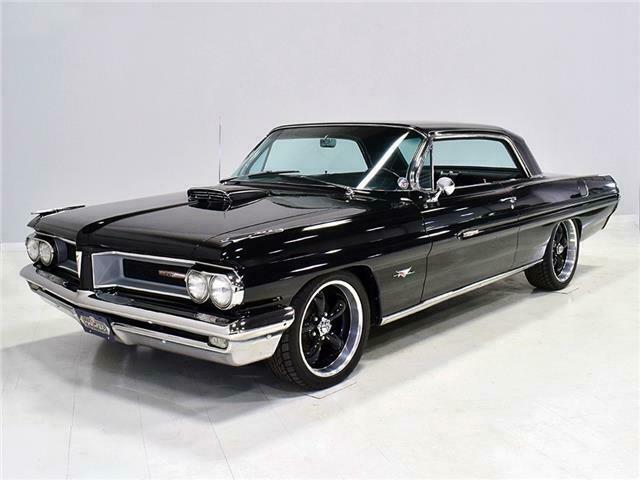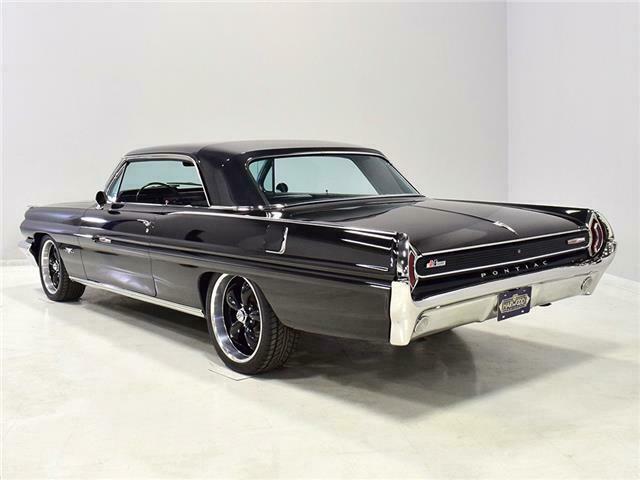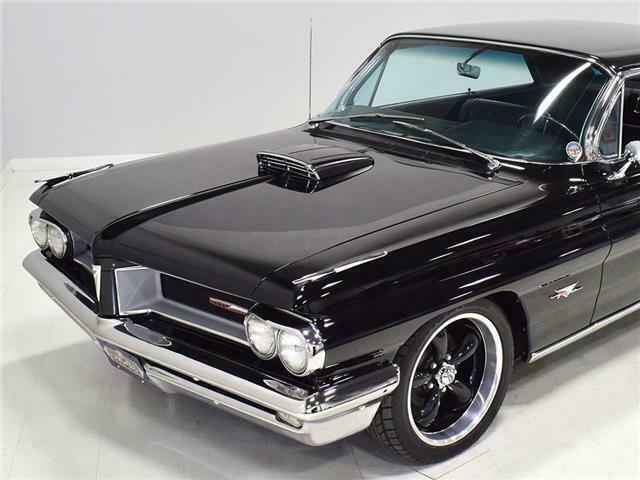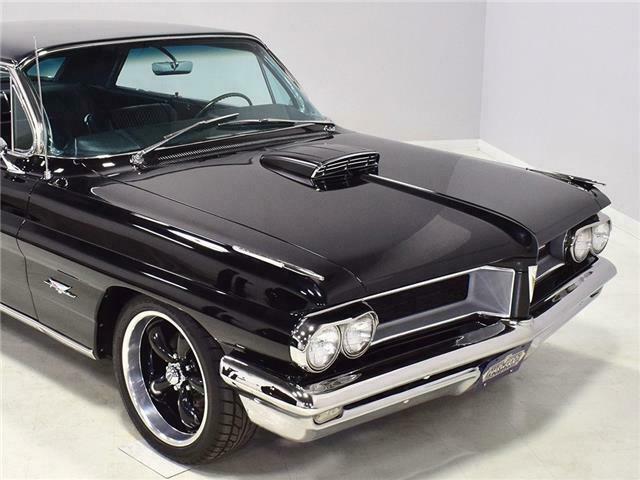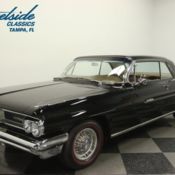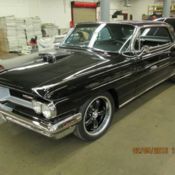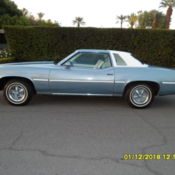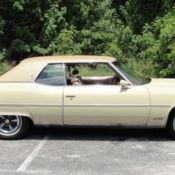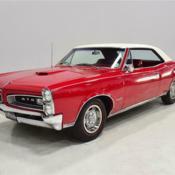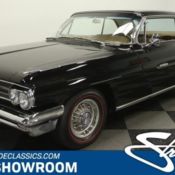|
By the early 1960s, Pontiac's new marketing plan that showcased performance, luxury, and style in equal doses was starting to pay off in a big way, and there's no better example of how they were getting it right than the new-for-62 Grand Prix. Thanks to John DeLorean and Pete Estes, Pontiacs were now the car to have if you were a young professional who wanted some performance without looking like a juvenile delinquent. The Grand Prix in particular stood out,... an all-new car that would compete with the Ford Thunderbird in the "personal luxury" segment, and there are many who consider the ground-breaking '62s as the best-looking of them all. Available only as a hardtop, the lean, muscular Grand Prix emphasized performance without forgetting what full-sized American luxury was supposed to be. As a result, the Grand Prix is a lot of fun to drive but also comfortable enough to just cruise without effort, making it a fantastic choice if you need one car to do it all. Don't let the big wheels fool you, this is an exceptionally well-restored and very stock Grand Prix. It was delivered new to Eldridge Pontiac-Buick in Princeton, New Jersey and it is indeed a factory Starlight Black car. It clearly didn't spend much time out in the elements, as the undercarriage is incredibly clean and the laser-straight flanks show no evidence of wholesale panel replacement or careless bondo work—even the quarter panels still show their original spot welds. The photos don't lie, this sucker is STRAIGHT! Thanks to some expensive restoration work, it shows extremely well with great panel fit, a deep gloss to the paint, and a few tricks like the Super Duty hood scoop and the roof, which has a little metallic in the finish to match the custom wheels. It's just a great-looking car from any angle, and the black paint gives it a predatory look that seems entirely right for a full-sized Pontiac that the original marketing documents called a "sports car." It's definitely got the moves. In 1962, there was still plenty of chrome, and all the brightwork on this particular Grand Prix is in fantastic shape, from the bumpers (which have been recently refinished) to the cool strip of chrome that runs along the tops of the quarters to emphasize the mini fins still perched on top. You also get neat little details like the ornaments atop each front fender, the highly detailed Grand Prix emblems, and those awesome crescent-shaped taillights. Oh, and there's a Hurst badge on the trunk, something that this car earns honestly (more on that in a moment). All the glass is in excellent shape with a unique E-Z-EYE tint and the weather seals were replaced so it seals up like a luxury car should. The interior was changed from parchment to black during the restoration, and I can't imagine anyone would complain about that decision. Correct seat covers show simple vertical pleats and it's pretty awesome to see buckets and a console in a full-sized cruiser like this. Note that the steering wheel with its clear plastic rim is in fantastic original condition, something you don't see very often on these cars and the reproduction parts aren't quite the right color. Factory gauges include a wide speedometer, ammeter, and fuel gauge in the main panel, plus a functional tachometer down on the console, all joined by an aftermarket temperature gauge very neatly integrated into the dash next to the lighter. That Hurst badge on the trunk refers to the unique Hurst "Dual Gate" shifter on the console, also called the "His-N-Hers" shifter that was popular on Pontiacs throughout the '60s. However, we have never seen one like this with a built-in key lock to lock out the manual feature in the right-hand gate—too cool! It also neatly corrects one of the only complaints road testers had about the Grand Prix: the factory shifter was just too vague for manual shifting. The original AM radio is still in the dash and everything works except the clock, which isn't much of a surprise. The back seat is big enough for two adults, who get their own speaker and a fold-down armrest. The massive trunk is correctly finished with red mats and cardboard side panels, and you'll find no issues lurking underneath. This is an extremely clean car! Pontiac's 389 cubic inch V8 was standard equipment in the Grand Prix, with this one topped by a Tri-Power setup that was added during the restoration. It's still 100% Pontiac and the way it drives will make you glad it's there. Correct Pontiac Turquoise engine enamel, those little chrome air cleaner, and even a generator keep the engine bay looking very correct and authentic. There's a giant radiator up front, new wiring throughout, a reproduction Delco "tar top" battery, and aside from one or two hose clamps, it's pretty much the way the factory intended. Power steering and brakes are a welcome addition to the options list on a car this large, and the muscular 389 has no problems making this car move the way its looks would imply. It starts easily and idles well with no fussiness from the carburetors, and on the road there's a definite spot where you can feel the outer carbs coming online, joined by a substantial hit of acceleration. This is a big car but it is certainly not a slow car and if you like to drive, the Grand Prix delivers! Underneath you'll find completely solid floors that remain in fantastic condition. There's a light dusting of undercoating just to seal it up, but it hides nothing and the original seams and welds are all clearly visible; more proof that this car never spent its time in winter weather. The new 3-speed Roto-Hydramatic automatic transmission shifts well and spins 3.23 gears in the giant rear end, making this a superb high-speed cruiser. The suspension features new shocks, the exhaust system is recent with mellow-sounding Flowmaster mufflers, and a fresh gas tank hangs out back so this car is ready to enjoy immediately. Pontiac's brakes were some of the best in the business in 1962, so they were left stock and those giant Boss Motorsports wheels were installed on top with staggered 245/40/18 front and 245/40/20 rear tires. Paperwork includes a full PHS documentation package, reproduction window sticker, and an original sales brochure. With fewer than 30,000 built in its first year, the Grand Prix is still pretty exclusive, and this big black coupe has a ton of presence on the road or on the show field. It has been beautifully restored and runs well enough to go anywhere. If you're a fan of Pontiac performance in the '60s, perhaps something a little less common than a GTO will fill the bill. We promise this car will draw a crowd wherever it goes and the guy behind the wheel will always be smiling. Call today!
|
 Home
Home Contact us
Contact us NEWEST CARS
NEWEST CARS SELL YOUR CAR
SELL YOUR CAR FAQ
FAQ
